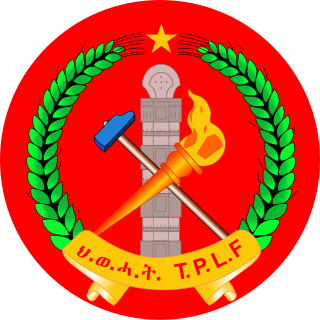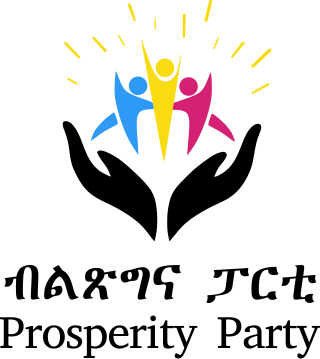
The politics of Ethiopia are the activities associated with the governance of Ethiopia. The government is structured as a federal parliamentary republic with both a President and Prime Minister. The government is multicameralism with a house of representative and a council. The term politics of Ethiopia mainly relates to the political activities in Ethiopia after the late 20th century when the democratization took place in the nation. The current political structure of Ethiopia was formed after the Tigrayan People's Liberation Front (TPLF) overthrew dictator President Mengistu Haile Mariam in 1991. General election was held in June 1994 and Ethiopia has maintained a multiparty political environment till today.

Ethiopia, officially the Federal Democratic Republic of Ethiopia, is a landlocked country in the Horn of Africa. It shares borders with Eritrea to the north, Djibouti to the northeast, Somalia to the east and northeast, Kenya to the south, South Sudan to the west, and Sudan to the northwest. Ethiopia has a total area of 1,100,000 square kilometres. As of 2022, it is home to around 113.5 million inhabitants, making it the 13th-most populous country in the world and the 2nd-most populous in Africa after Nigeria. The national capital and largest city, Addis Ababa, lies several kilometres west of the East African Rift that splits the country into the African and Somali tectonic plates.

Meles Zenawi Asres was an Ethiopian soldier and politician who served as President of Ethiopia from 1991 to 1995 and then Prime Minister of Ethiopia from 1995 until his death in 2012.

Italian Somaliland was a protectorate and later colony of the Kingdom of Italy in present-day Somalia. Ruled in the 19th century by the Somali Sultanates of Hobyo and Majeerteen in the north, and the Hiraab Imamate and Geledi Sultanate and the Biimaal Sultanate leading a resistance against the colonials in southern Somalia for decades. The territory was acquired in the 1880s by Italy through various treaties.

The Tigray People's Liberation Front, also called the Tigrayan People's Liberation Front, is a left-wing ethnic nationalist paramilitary group, a banned political party, and the former ruling party of Ethiopia. It is designated as a terrorist organization by the Ethiopian government. It is widely known as Woyane or Wayane in older texts and Amharic publications.

Under the current constitution, Ethiopia conducts local, regional, and federal elections. At the federal level, Ethiopia elects a legislature. The Federal Parliamentary Assembly has two chambers: the House of People's Representatives with not more than 550 members as per the constitution but actually nearly 547 members, elected for five-year terms in single-seat constituencies; and the Council of the Federation with 117 members, one each from the 22 minority nationalities, and one from each professional sector of its remaining nationalities, designated by the regional councils, which may elect them themselves or through popular elections.
Badme is a town in Gash-Barka region of Eritrea. Control of the town was at the centre of the Eritrean–Ethiopian border conflict, which lasted from the beginning of the Eritrean–Ethiopian War, in 1998, to the signing of a joint statement at the Eritrea–Ethiopia summit in 2018, twenty years later.

The People's Democratic Republic of Ethiopia (PDRE) was a socialist state that existed in Ethiopia and present day Eritrea from 1987 to 1991.

The Somali Republic was the name given to the newly independent state of Somalia, following the unification of the Trust Territory of Somaliland and the State of Somaliland. A government was formed by Abdullahi Issa Mohamud and Muhammad Haji Ibrahim Egal and other members of the trusteeship and protectorate administrations, with Haji Bashir Ismail Yusuf as President of the Somali National Assembly and Aden Abdullah Osman Daar as President of the Somali Republic. On 22 July 1960, Daar appointed Abdirashid Ali Shermarke as Prime Minister. On 20 July 1961 and through a popular referendum, Somalia ratified a new constitution, which was first drafted in 1960. The new constitution was rejected by Somaliland.

The Benishangul Gumuz People's Democratic Unity Front was a political party in Ethiopia. In the 2010 elections, the BGPDUF won 9 seats. In local elections held the same day, the BGPDUF won 98 of the 99 seats in the Benishangul-Gumuz parliament.
The 2005 Ethiopian general election violence, known generally as the Ethiopian police massacre, refers to the killing of civilians by government forces during June and November 2005 which led to the deaths of 193 protesters and injury of 763 others, mostly in the capital Addis Ababa, following the May 2005 elections in Ethiopia. More than 30,000 people were detained by security forces following the election, most released in 2006.

Eritrea, officially the State of Eritrea, is a country in the Horn of Africa region of Eastern Africa, with its capital and largest city at Asmara. It is bordered by Ethiopia in the south, Sudan in the west, and Djibouti in the southeast. The northeastern and eastern parts of Eritrea have an extensive coastline along the Red Sea. The nation has a total area of approximately 117,600 km2 (45,406 sq mi), and includes the Dahlak Archipelago and several of the Hanish Islands.

General elections were held in Ethiopia on 7 and 18 May 1995 for seats in its Council of People's Representatives; elections in the Afar, Somali, and Harari Regions were delayed until 28 June to assign experienced personnel who could solve possible conflicts and irregularities. This was the first regular multi-party election in Ethiopian history, and the first election since the adoption of a permanent constitution the previous December. Several opposition parties boycotted the election, including the All-Amhara People's Organization, Council of Alternative Forces for Peace and Democracy in Ethiopia, and Ethiopian Democratic Unity Party.

The Ethiopian Democratic Party is a political party in Ethiopia. The result of no less than five mergers of liberal and conservative liberal opposition parties, it could trace its roots to the Ethiopian Democratic Union, which mounted armed monarchist resistance to the Derg in the immediate aftermath of the overthrow of Haile Selassie I. In the legislative elections held on 15 May 2005, the United Ethiopian Democratic Party – Medhin, as it was then known, was part of the United Ethiopian Democratic Forces, that won 52 out of 527 seats in the Council of People's Representatives. It won no seats in the 2010 elections.

General elections were held in Ethiopia in 1969 to elect all members of the Chamber of Deputies, the lower house of the Imperial Parliament. Political parties were banned, so all candidates were independents, and Aklilu Habte-Wold remained Prime Minister.

Elections for a Constituent Assembly were held in Ethiopia on 5 June 1994 in order to form a body to draw up a new constitution. They were the first elections after the overthrow of the Mengistu regime at the end of the Ethiopian Civil War in 1991, and the first ever multi-party elections in the country; previous elections had either been non-partisan or one-party. The results saw the Ethiopian People's Revolutionary Democratic Front and its allies win 463 of the 544 seats. Voter turnout was 87.5%.

The Transitional Government of Ethiopia (TGE) was an era established immediately after the Ethiopian People's Revolutionary Democratic Front (EPRDF) seized power from the Marxist-Leninist People's Democratic Republic of Ethiopia (PDRE) in 1991. During the transitional period, Meles Zenawi served as the president of the TGE while Tamrat Layne was prime minister. Among other major shifts in the country's political institutions, it was under the authority of the TGE that the realignment of provincial boundaries on the basis of ethnolinguistic identity occurred. The TGE was in power until 1995, when it transitioned into the reconstituted Federal Democratic Republic of Ethiopia that remains today.
General elections were held in Ethiopia on 24 May 2015 to elect officials to the House of Peoples' Representatives. Regional Assembly elections were also held on this date.

The 2021 Ethiopian general election to elect members of the House of Peoples' Representatives was held on 21 June 2021 and 30 September 2021. Regional elections were also held on those dates.

The Prosperity Party is a political party in Ethiopia that was established on 1 December 2019 as a successor to the Ethiopian People's Revolutionary Democratic Front (EPRDF) by incumbent Prime Minister Abiy Ahmed. The merger into a countrywide party is part of Abiy's general policy of distancing the country's politics from ethnic federalism. It ran for the first time in the 2021 general election.












